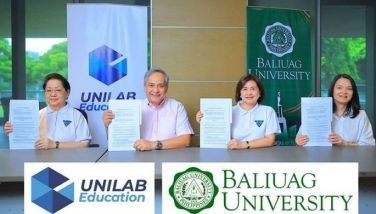Vaccines without borders

The world justifiably rejoiced at the rapid development of vaccines and its global deployment just a year after the COVID-19 pandemic broke out. Vaccines usually take several years – even decades – to develop and test for safety and efficacy before they are rolled out. The COVID-19 vaccines are key to controlling the pandemic and resuming business activities. It will allow countries to reopen borders safely for global commerce, for the movement of business, and for tourism. This will be music to the ears of DOLE Secretary Silvestre Bello and Tourism Secretary Bernadette Romulo-Puyat. But there is a worrying trend that threatens to derail control of the disease and economic recovery: inequitable access to COVID-19 vaccines and bias towards “Western” vaccines.
Vaccine nationalism
Vaccine nationalism is the newspeak for countries that have managed to secure doses of vaccines for its own people and required their manufacturers to prioritize the domestic market before they are made available in other countries. As a result, developed countries have procured vast amounts of vaccine that far exceed their population. The United States had ordered more than twice the necessary doses to cover its own population, and the UK – approximately five doses for each citizen. Canada, Australia, and Japan – having only one percent of the world’s COVID?19 cases – had collectively reserved some one billion vaccine doses. This has severely impaired vaccine supply in low and middle-income countries, including the Philippines.
This was done through pre-purchase agreements by their government and vaccine manufacturers, which include American firms Pfizer, Moderna, and Johnson & Johnson, and British Swedish company AstraZeneca – the so-called Western brands. The Philippines had a chance to pre-purchase those vaccines from the same manufacturers, but bungled the opportunity to do so. Indonesia and many South American countries turned to non-Western vaccine suppliers – principally China and India for the majority of their requirements. Thanks to Chinese vaccine diplomacy, the Philippines did so too, belatedly. It was also supplied some quantities of Western vaccines, mainly AstraZeneca through the UN’s COVAX facility. The private sector did its part by negotiating a tripartite agreement with government to secure Moderna and is awaiting delivery. The Philippines has eight million doses of Sinovac on hand out of 25 million ordered.
Vaccine nationalism may be politically expedient for leaders of vaccine producing countries, but incredibly short-sighted. Even if they were able to vaccinate the majority of their population, it would mean the virus would continue to rage in other countries that have not been able to do so. The longer the virus is allowed to ravage unchecked, the more likely it is to mutate. That is what happened in Brazil, India, and South Africa – where new variants emerged. It is inevitable that an “escape” mutation would surface that would allow the virus to evade the immune response triggered by vaccinations. The new mutation is then likely to become the dominant strain, setting off a whole new set of infections in those vaccinated against only the old variants.
COVAX
This is why the COVAX facility was set up by the UN with support from the private sector, including the Gates Foundation, to help ensure low and middle-income countries have access to vaccines. But to date the facility has fallen short of its objective of providing 20 percent of the needs of developing countries. It has been plagued by short supply because of vaccine nationalism. This supply crunch was further exacerbated when India – the world’s biggest vaccine manufacturer – decided to stop exports to take care of its own surge.
Vaccine bias
Vaccines may hold the key to reopening borders and expediting movement of business people and workers in ships, aircraft, factories and other service providers, but apparently it depends on what brand. The “Western vaccines” were the first movers, having completed their clinical trials which were peer reviewed. This resulted in their approval by many national FDA’s and being granted WHO Emergency Use Listing (EUL) – the stamp of approval recognized worldwide. The Philippines – along with Indonesia, Brazil and Chile among others – had to settle for Sinovac, which at that time was still largely unproven because of the lack of clinical data and was therefore not granted WHO EUL. Sinovac, therefore, was considered inferior compared to Western brands, particularly in a social media aware Philippines. Even though it is widely available, people have been consciously avoiding Sinovac and opting to wait when Western vaccines become widely available. When a few Pfizer doses became available through COVAX, there was nearly a stampede of people wanting to get the shots.
The few countries that have opened their borders now only allow travelers vaccinated with Western brands to be exempt from strict quarantine requirements. For example, Saudi Arabia has required our OFWs vaccinated with Sinovac to take the swab test and undergo the full quarantine protocol as if they have not been vaccinated.
It has also been reported that seafarers working for European ships also won’t be allowed to return to work if they are not injected with Western brand vaccines. This prompted President Duterte to order seafarers and OFWs to be administered with the Pfizer or Moderna vaccines – which are currently not available. I thought this was a knee-jerk reaction and only encourages that discrimination to continue. It didn’t help of course that the President chose to be vaccinated with Sinopharm, when its importation was still not authorized by DOH.
This vaccine bias will become a major issue as more and more countries open up and make vaccination a requirement for entry and show proof for it through a “vaccine passport”. The WHO does not currently endorse requiring proof of COVID-19 vaccination or immunity as a condition of entry. This is because the efficacy of vaccinations in preventing transmission of COVID-19 has yet to be proven and the inequitable global distribution and use of vaccines due to the current limited global vaccine supply. But this may change as vaccine supply expands and as evidence regarding transmission become available. Nevertheless, many countries have chosen to go ahead and impose such requirements.
Avoiding noodle bowl of rules
APEC has been examining this issue and has recommended that governments look at adopting common standards for testing, vaccinations, and consistent quarantine protocols across economies. Given that different economies are at different stages of managing their domestic situation and vaccination drives, APEC maintains that having a framework in place would avoid a “noodle bowl of rules” that can result in unnecessary costs, complexity, and time spent in quarantine. This may eventually involve mutual recognition of vaccinations or test results through a digital health passport or similar mechanism using as basis recognition of vaccines with WHO EUL or national regulatory authorization. The Philippines should support these initiatives and work through APEC, ASEAN and UN agencies WHO, ILO, IMO, ICAO, as well as IATA.
In a positive development, the WHO recently granted EUL to Sinovac following completion of requirements to provide data to support its efficacy and safety. Real world results have also shown high efficacy rates of 97 percent in preventing hospitalization and 100 percent in preventing deaths.
The government should also give the private sector a greater role in the roll out of vaccines by utilizing them to build vaccine confidence with their employees and their dependents about the safety and benefits of the vaccine, as well as incentivizing and making it easier for employees to get vaccinated. Serious consideration should also be given to allowing the private sector to import vaccines for their own use.
And by the way, I am looking forward to my second jab of Sinovac today. Lest you think that I have had a change of heart about Chinese actuations in the West Philippine Sea, let me clarify that although I believe vaccines should have no borders – even Chinese ones – it does not apply to our maritime boundaries.
- Latest
- Trending


























